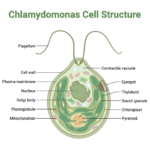IB Biology 13 Views 1 Answers
Sourav Pan🥇 GoldNovember 9, 2024
How does HCG (human chorionic gonadotropin) stimulate the ovary to secrete progesterone during early pregnancy?
How does HCG (human chorionic gonadotropin) stimulate the ovary to secrete progesterone during early pregnancy?
Please login to save the post
Please login to submit an answer.
Sourav Pan🥇 GoldMay 15, 2025
Human chorionic gonadotropin (hCG) plays a critical role in early pregnancy by stimulating the ovaries to secrete progesterone, which is essential for maintaining the uterine environment suitable for embryo development. Here’s how hCG functions in this capacity:
Mechanism of hCG Action on Progesterone Secretion
- Production of hCG:
- After fertilization, the developing embryo forms a structure called the blastocyst, which implants into the uterine lining (endometrium). The outer layer of the blastocyst, known as the trophoblast, begins to produce hCG shortly after implantation.
- Interaction with Corpus Luteum:
- hCG has a structure similar to luteinizing hormone (LH), allowing it to bind to LH receptors on the cells of the corpus luteum in the ovaries. The corpus luteum is formed from the remnants of the ovarian follicle after ovulation and is responsible for producing progesterone.
- Stimulation of Progesterone Production:
- Upon binding to its receptors, hCG stimulates the corpus luteum to continue producing progesterone. This action is crucial because progesterone helps maintain the thickened endometrial lining, which is necessary for successful implantation and support of the developing embryo.
- Specifically, hCG promotes steroidogenesis in the corpus luteum, ensuring that sufficient levels of progesterone are maintained during the first trimester of pregnancy until the placenta takes over this function.
- Prevention of Menstrual Cycle Resumption:
- By promoting progesterone production, hCG prevents the breakdown of the endometrial lining that would normally occur if pregnancy did not happen. This is vital for sustaining pregnancy and preventing menstruation.
- Support for Embryo Development:
- Progesterone not only supports the uterine lining but also plays a role in suppressing maternal immune responses against the embryo and promoting vascular changes that enhance blood flow to the developing fetus.
Importance of hCG and Progesterone in Early Pregnancy
- Nutritional Support: Progesterone prepares and maintains a nutrient-rich environment in the uterus, which is essential for embryo growth and development.
- Hormonal Balance: The interplay between hCG and progesterone helps maintain hormonal balance during early pregnancy, ensuring that both maternal and fetal needs are met.
- Transition to Placental Function: As pregnancy progresses, around 10 weeks gestation, the placenta begins to produce its own progesterone, reducing reliance on hCG for this function. However, during early pregnancy, hCG is crucial for supporting the corpus luteum and ensuring adequate progesterone levels until placental function is fully established.
0
0 likes
- Share on Facebook
- Share on Twitter
- Share on LinkedIn




